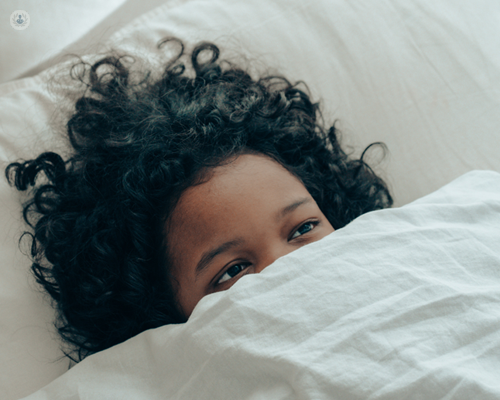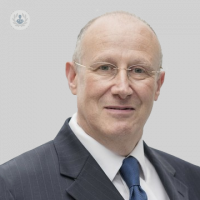Sleep disorders in children: Answering the questions keeping parents up at night
Escrito por:For many parents and carers, sleep disorders can cause perplexing issues in their children. Symptoms like snoring, failure to settle and parasomnias can be difficult to address, so it's reassuring to know that there's medical assistance available to relieve what can become deeply stressful situations.
Here to put various sleep disorder queries to bed in this informative article is leading consultant respiratory paediatrician and pulmonologist Dr Mark Rosenthal.

What are the three most common sleep disorders in children?
The three most common sleep disorders in children, would be:
- Snoring, which is almost invariably due to enlarged adenoids, and or, tonsils;
- Persistent failure to settle after waking in the night, in generally infants and toddlers, and;
- Parasomnias, which are night terrors and nightmares in children.
What are the symptoms of sleeping disorders in children?
In essence, not doing what their parents think they ought to be doing. In other words, frequently, infants and toddlers will go to sleep and then wake, and then won't go back to sleep again. The other common problem of symptoms are snoring, restless sleep, not waking in the mornings refreshed, in other words having to be dragged out of bed, sleeping at school, for example, and things like that.
Adolescents are notorious for going to bed late and in fact, one's circadian rhythm is not 24 hours but 25. So, in studies where volunteers have been in uniform light conditions 24 hours a day with no clocks, they all go to sleep approximately one hour later every day. Adolescents going to sleep at one o'clock in the morning and not being able to get up for school is a notorious thing, and this is due to a shift in the circadian rhythm which needs to be put back to a more conventional place.
What are the causes for sleep disorders in children?
The commonest cause, overwhelmingly, for snoring in children, is due to adenotonsillar hypertrophy. It's the physical obstruction of airflow through the back of the nose, mostly due to the adenoids, but also due to the tonsils that actually get in the way. If one put's one's fingers over one's nose, one can only breathe through one's mouth, so one will inevitably snore.
In infants and toddlers with persistent failure to go back to sleep, it's important to remember that sleeping, like most things in life is a learnt behaviour. It isn't natural, so the rules about going to sleep at this time and waking up at that time, have to be learnt by infants and toddlers. Some children are better at learning it than others, and to be blunt, some parents are better at teaching it than others. It's really getting the two together so that the child has understood, effectively, that this is the moment for going to sleep and later on will be the moment for waking up.
How are sleep disorders assessed in children?
Like everything in paediatrics, and indeed the whole of medicine, taking a detailed history from the family and where appropriate, the child, is of crucial importance. We go through a typical night, from the evening meal, through bath time, bedtime routine; what parents do if they wake up later, what are the effects of the snoring on the child?, what is in the adolescent's room? How many computers, phones, lights, etcetera, and other distractions that prevent going to sleep, that is where 80 to 90 per cent of the information will be found.
The only important test, if it is required, and it isn't always required by any means, is a sleep study where the child is admitted for an overnight assessment and the parent stays with them, where various leads and cables are put on the body - no needles, of course, and one can assess how they breathe, whether they have difficulty breathing due to their snoring, whether their oxygen levels are normal, whether the waste gas level - mainly carbon dioxide, is also normal. That can give very useful information about whether, for example, surgery is required by taking out your adenoid and tonsils, but quite often it's blindly obvious without a sleep study.
Also, whether other things are required, especially in special circumstances, for example, children with Down's syndrome, Trisomy 21, or children with neurodevelopmental disorders, where this becomes much more important. Or children with neuromuscular disorders, for example Duchenne muscular dystrophy (DMD), which is of course, a specialised subject, and not common.
What are the treatments for sleep disorders?
For snoring children, which most commonly occur between the ages of three and six years, medically, a trial of montelukast for about eight to 12 weeks does have scientific evidence for benefit in a considerable number, but not everybody. However, if that fails and there are large adenoids and tonsils, then I'm afraid it's a referral to ENT surgeons for consideration of removal of the adenoids, and either shaving or removal of the tonsils depending on which is the bigger problem. For night waking, or failing to settle at night in younger children, then this is a matter of training. Having a sleep plan, and one of the biggest issues of these, are parents disagreeing about how manage the child under those circumstances, and I often say to parents: 'I don't particularly care what the sleep plan is, as long as you both agree to it, write it down and absolutely, religiously stick to it.
For adolescents going to sleep too late, and not getting up for school, then the trick is to use a half term holiday and to force the adolescent to go to bed three hours later every day. So if they're going to bed at one AM, we're going to make them to go to sleep at four AM, then seven AM in the morning, 10 AM etc, and after about seven days, you've got round to about nine to 10PM at night. It's much easier to push a circadian rhythm than to pull a circadian rhythm back.
What are the paediatric sleep guidelines parents should follow?
As anybody whose ever used the Internet, there's absolutely acres of advice on sleep management, and any number of books. I don't think that in the UK, there's an official government sleep guideline, except that sleep is extremely good for one.
Is waking up during the night something to be worried about?
It's worth remembering one thing: We all wake up seven or eight times a night. That is evolutionarily essential, because when we were sleeping outside, thousands of years ago, we had to make sure we weren't about to be eaten by lions. The problem is never that someone wakes up, is that they don't go back to sleep again. That is always the issue.
If you'd like to arrange a consultation with this leading paediatric pulmonologist, visit Mr Rosenthal's Top Doctors profile.


